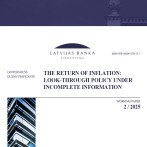Global developments and tax raises continue to determine Latvian inflation
As forecast, annual inflation continued to rise also in February, reaching 4.0% and, with the price level going up 0.3% within a month, the 12-month average inflation turned positive and reached 0.2%. The rise in retail prices in February continued to reflect tax hikes in Latvia and the rises in global energy resource and food prices. Food prices continued to rise: prices were higher for vegetables and fruits as well as dairy and grain products. Influenced by the rising oil prices, fuel prices continued up but at a slower rate than at the end of last year. The February inflation may have been driven up also by a delayed influence of rising VAT rates.
It is difficult to make any predictions for the medium term as to how global prices are going to develop, which, along with the tax hikes, are one of the main inflation driving factors in Latvia. The leap in oil prices in recent weeks, caused by the concern over the unrest in Libya, indicate that this year the global energy resource prices are likely to exert a significant pressure on prices, also in Latvia. Yet the extent of this leap depends on the ability of oil producers to prove to the market that additional production capacities are available to cover the possible oil deficits. The risk, albeit small, that political instability can spread to other countries of the region, particularly Saudi Arabia, makes this task complicated.
Food prices, rising since last summer when the extreme weather conditions acted to reduce the amounts of grain harvested, have driven retail food prices all over the world. Although it can be expected that, as the new harvests come in, price rises will diminish, the rapid rise in energy prices, which drives up the food producer expenditures, reduces the likelihood that food prices will drop sharply in the second half of the year.
The fact that in Latvia a great part of goods both in retail and manufacturing are imported has been finding its reflection in domestic prices for some time now. The rising prices in Latvia affect both producers and consumers, particularly those with low incomes, because the rising raw material prices drive up the prices of essential goods. At the same time, the demand for other goods and services drops, which forces businesses to continue to think about optimizing their costs and reducing their prices to maintain turnover. This is likely to be the determining factor that will limit any rise in the overall price level in the near future.
It can still be expected that in the near future inflation will diminish as a result of base effect, even though the rapidly rising oil prices exert an important upward pressure. The abating inflation, however, would be limited by the possible raising of tax rates in the middle of the year: as currently planned, it would drive up inflation by almost 0.5 percentage points.
Textual error
«… …»






